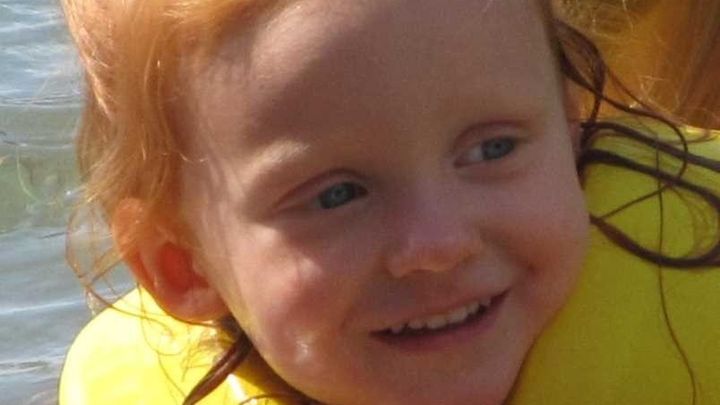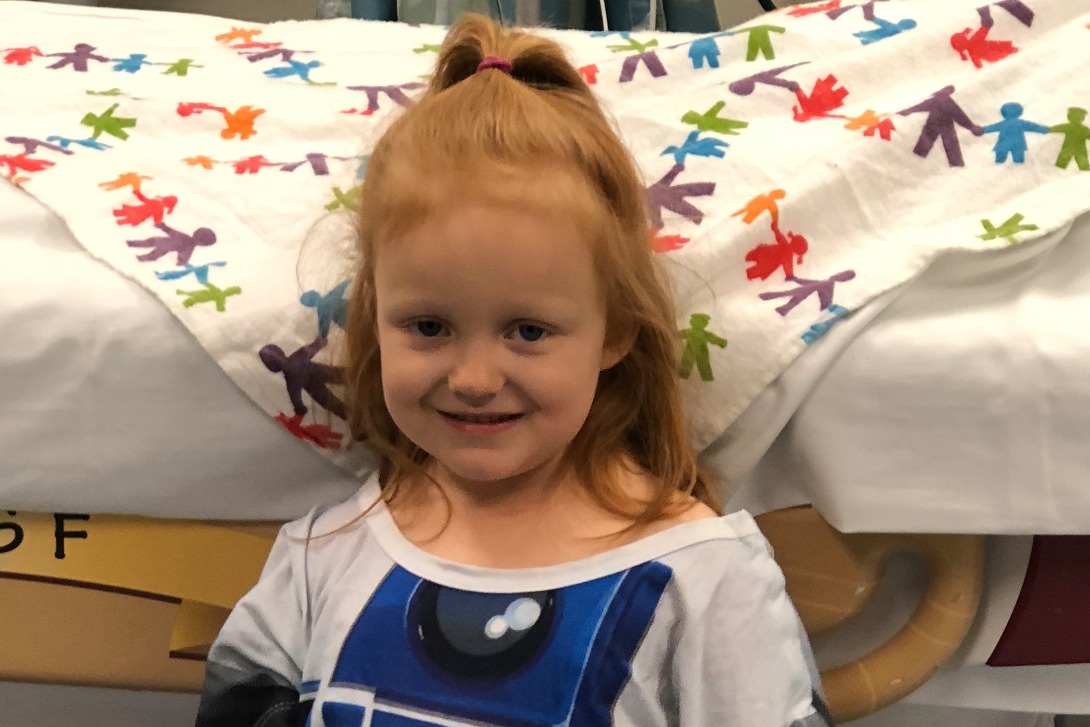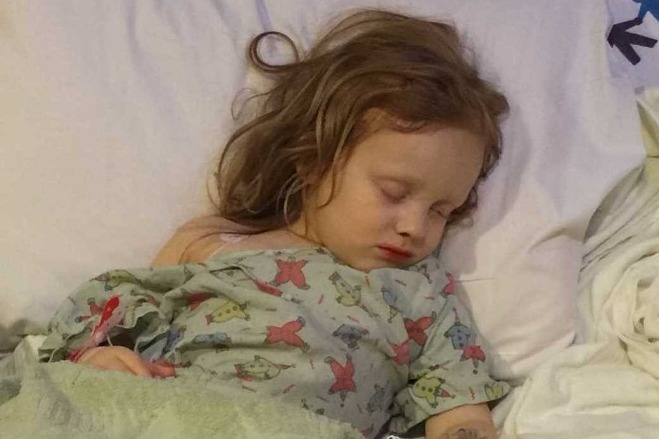
Help for Emma
Donation protected
This is Emma. She's five years old.

She loves animals, music, dancing, anything to do with nature, and watching mom cook. She is an intelligent, thoughtful, observant little girl with a sharp sense of humor and a gift for making people laugh. Her favorite movies are Secret Life of Pets and Trolls. She wants to be a chef when she grows up.
Her career path is an interesting choice, since she's had health problems most of her life that have made it a struggle for her to eat and grow. Doctors failed to find anything wrong with her, until October 20, 2016. Emma was diagnosed with a brain tumor in her pituitary region, called a craniopharyngioma. It grew so large that it damaged her pituitary gland and pressed on her optic nerves. She lost most of the peripheral vision in her eyes. It's very common for this type of tumor to grow back after it's been removed the first time.

In January 2017, she had brain surgery via her nasal passages to remove the tumor. Within 9 months of the surgery, it began to regrow. She had a second surgery on March 22, 2018 to try to remove it. Neurosurgeons were unable to completely excise it because it has adhered to her optic nerves. In addition to her visual deficits, she suffers from hypopituitarism, including adrenal insufficiency and diabetes insipidus. Both are potentially life-threatening conditions. She is on medicine to replace most of the hormones her pituitary gland normally makes. She will need them for the rest of her life, along with a lifetime of specialized medical care to closely monitor her health.

Emma will need radiation treatments this summer. Because of the tumor being stuck to her optic nerves, the radiation will be a small dose per day, most likely five days a week for about six weeks. The radiation will eventually cause what's left of her pituitary function to fail completely and put her at risk for a bunch of late onset side effects which may include more vision loss, as well as learning difficulties.
The city where Emma's family lives doesn't have the all particular types of pediatric specialists necessary to provide her with the care she needs for this chronic condition. While some of her care is done locally, the majority of her specialized care is done at a children's hospital in another state where the surgery was performed. The radiation treatments will also be done there for continuity of care.
In February, 2017, about six weeks after Emma's surgery, her dad, Scott, suffered two heart attacks on the same day, and needed three stents placed in his arteries to save his life. He will also be on medication for the rest of his life to keep his cardiac function normal. The medicines he is on have uncomfortable side effects that can be quite debilitating. He is working hard to regain his health, and has begun to finally feel better, but is still under careful observation by his cardiologist.
The family is very concerned about the future. The co-pays for tests/procedures/surgeries, hospital admissions, multiple medicines and multiple doctor appointments for Emma and her dad each month add up quickly. Emma needs regular blood draws to check her hormone levels. Travel expenses for Emma's follow-ups at the children's hospital are costly. She will most likely need to be sedated for her radiation treatments since she is too young to hold herself motionless, a skill crucial to her treatment regimen. This elevates her treatment appointments to out-patient procedures which will quadruple the co-pays her parents will pay for each one. Her mom, Kirstin, has the nearly full-time job of managing all the health care needs of both her husband and daughter, as well as caring for another child, and as a result is unable to work. Her dad will have no choice but to stay behind and continue to work as much as possible. Her older sister will stay with close family for the duration of the radiation treatments.
The family needs help to offset the many daily costs associated with two people's chronic medical conditions. They also hope to possibly offset any unforseen/unknown costs that might arise should Emma's tumor return a third time and/or should her dad's condition worsen.
They understand that there are many other people in need who choose to start their own campaigns. Whether you donate to Emma's campaign or not, thank you so much for taking the time to read about her and her family's situation!


She loves animals, music, dancing, anything to do with nature, and watching mom cook. She is an intelligent, thoughtful, observant little girl with a sharp sense of humor and a gift for making people laugh. Her favorite movies are Secret Life of Pets and Trolls. She wants to be a chef when she grows up.
Her career path is an interesting choice, since she's had health problems most of her life that have made it a struggle for her to eat and grow. Doctors failed to find anything wrong with her, until October 20, 2016. Emma was diagnosed with a brain tumor in her pituitary region, called a craniopharyngioma. It grew so large that it damaged her pituitary gland and pressed on her optic nerves. She lost most of the peripheral vision in her eyes. It's very common for this type of tumor to grow back after it's been removed the first time.

In January 2017, she had brain surgery via her nasal passages to remove the tumor. Within 9 months of the surgery, it began to regrow. She had a second surgery on March 22, 2018 to try to remove it. Neurosurgeons were unable to completely excise it because it has adhered to her optic nerves. In addition to her visual deficits, she suffers from hypopituitarism, including adrenal insufficiency and diabetes insipidus. Both are potentially life-threatening conditions. She is on medicine to replace most of the hormones her pituitary gland normally makes. She will need them for the rest of her life, along with a lifetime of specialized medical care to closely monitor her health.

Emma will need radiation treatments this summer. Because of the tumor being stuck to her optic nerves, the radiation will be a small dose per day, most likely five days a week for about six weeks. The radiation will eventually cause what's left of her pituitary function to fail completely and put her at risk for a bunch of late onset side effects which may include more vision loss, as well as learning difficulties.
The city where Emma's family lives doesn't have the all particular types of pediatric specialists necessary to provide her with the care she needs for this chronic condition. While some of her care is done locally, the majority of her specialized care is done at a children's hospital in another state where the surgery was performed. The radiation treatments will also be done there for continuity of care.
In February, 2017, about six weeks after Emma's surgery, her dad, Scott, suffered two heart attacks on the same day, and needed three stents placed in his arteries to save his life. He will also be on medication for the rest of his life to keep his cardiac function normal. The medicines he is on have uncomfortable side effects that can be quite debilitating. He is working hard to regain his health, and has begun to finally feel better, but is still under careful observation by his cardiologist.
The family is very concerned about the future. The co-pays for tests/procedures/surgeries, hospital admissions, multiple medicines and multiple doctor appointments for Emma and her dad each month add up quickly. Emma needs regular blood draws to check her hormone levels. Travel expenses for Emma's follow-ups at the children's hospital are costly. She will most likely need to be sedated for her radiation treatments since she is too young to hold herself motionless, a skill crucial to her treatment regimen. This elevates her treatment appointments to out-patient procedures which will quadruple the co-pays her parents will pay for each one. Her mom, Kirstin, has the nearly full-time job of managing all the health care needs of both her husband and daughter, as well as caring for another child, and as a result is unable to work. Her dad will have no choice but to stay behind and continue to work as much as possible. Her older sister will stay with close family for the duration of the radiation treatments.
The family needs help to offset the many daily costs associated with two people's chronic medical conditions. They also hope to possibly offset any unforseen/unknown costs that might arise should Emma's tumor return a third time and/or should her dad's condition worsen.
They understand that there are many other people in need who choose to start their own campaigns. Whether you donate to Emma's campaign or not, thank you so much for taking the time to read about her and her family's situation!

Organizer and beneficiary
Scott Edward
Organizer
Las Vegas, NV
Kirstin T. Erickson Dangler
Beneficiary